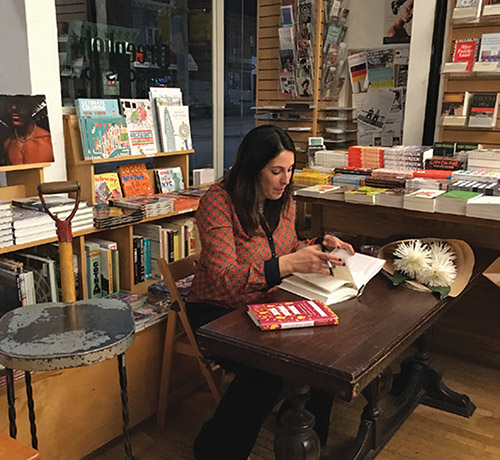

Discussing The Family Gene by Joselin Linder (2017). Hardcover. 272 pages. Ecco. ISBN-10: 0062378899. $17.36.
With varices in her digestive track that are so delicate they can burst at any time, author Joselin Linder spoke candidly and comfortably with The Moth senior producer, Kate Tellers, about her memoir/medical thriller, “The Family Gene,” at her book launch last month. A crowd filled the Greenlight Books bookstore in Fort Greene, Brooklyn, to hear Linder speak, and have her sign their copies of her book, published by Ecco, which she subtitled, “A Mission to Turn My Deadly Inheritance Into a Hopeful Future.”
Linder divulged that it was when a friend asked how her dad had died and, fascinated by the unsolved story Linder told, said, “You should write a book,” that her adventure began. The Family Gene is a compelling story, six generations deep, in which Linder clearly and forcefully gets across the fact that she plans to have her generation stomp out their defective family gene.
Born to Ashkenazi Jewish parents in Columbus, Ohio, in her mid-teens Linder was faced with a crushing reality. Her father, a doctor in his 40s, had developed mysterious medical symptoms. It wasn’t until his aunt-by-marriage revealed that her 34-year-old husband had died of acute massive ascites in 1961, and his mother, Linder’s great-grandmother Mae, had died of similar mysterious symptoms in 1955, that Linder realized the likelihood that they were dealing with a genetic illness.
Mae, born in 1899, was married in 1922. When the youngest of their five children was two, Mae experienced early symptoms of this disease, with which she lived for nearly two decades. The doctors at the time were baffled by her breathing problem, suggesting she may have been suffering from TB.
Linder’s paternal grandmother inherited the gene from Mae, her mother. From old family pictures, which showed Mae’s own mother’s swollen ankles, it appeared that Mae, too, had inherited the gene from her mother, whom they believe was “patient zero” of the genetic mutation.
In her 30s, Linder developed swollen ankles, the tell-tale sign of the family gene, and from there she gained a new purpose. Linder contacted a genetic researcher, Dr. Christine Seidman, from the Seidman Laboratory at Harvard Medical School; it turned out that Seidman had been researching Linder’s unique family gene for decades.
One of the telling symptoms, aside from the swelling, is a heart murmur. Lymphatic edema is another symptom of this one-in-a-billion spontaneous gene variant. What doctors have learned at the Seidman lab, since the death of Linder’s father, is monumental. They now know the mechanism causing the bad gene. Linder has learned that livers have a heartbeat. In her family, their livers are healthy; it’s the pressure in the portal veins of these organs that poses a problem.
Linder has had surgery twice, hoping that shunts to keep her portal veins open would help, but those operations both failed. Linder, in a moment of levity, noted, “I was told not to do any heavy lifting… ‘Yay.’ Or any strenuous exercise… ‘Yay.’”
In her ongoing humorous, light and easy-to-understand manner, Linder, without a trace of self-pity, added important snippets of science to The Family Gene. For example, she noted that women, with two X chromosomes, including one healthy X to help somewhat even things out, do better than men, with one X and one Y chromosome. The men tend to have more severe symptoms.
The hardest thing to watch, Linder admitted, was her grandmother seeing her two sons die, even though she had no idea it was from the gene she had passed down to them. After losing an unplanned pregnancy, Linder and her husband made the difficult decision not to have children. Her sister, also following an unplanned pregnancy, took a different route. With her husband’s encouragement and cooperation, after IVF preimplantation genetic diagnosis, she gave birth to healthy twins, a boy and a girl, who do not have the inherited gene.
Of the 14 people in Linder’s family who had the gene, seven are now living with it, including Linder and her sister.
In a Q & A after her talk, when asked how she keeps from getting too bogged down with her prognosis, described by doctors as “a ticking time bomb,” she replied, “My mantra calms me down. I want to live in peace and die in peace.”
The Seidman Lab is on the precipice of publishing their findings, according to Linder, and that’s when she believes they will be able to name the illness. A GoFundMe page has been set up by Linder at https://www.gofundme.com/wwwjoselinlindercome.
By Sharon Mark Cohen










